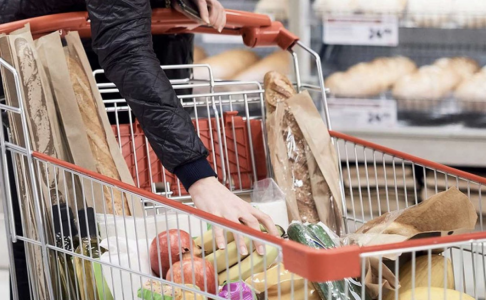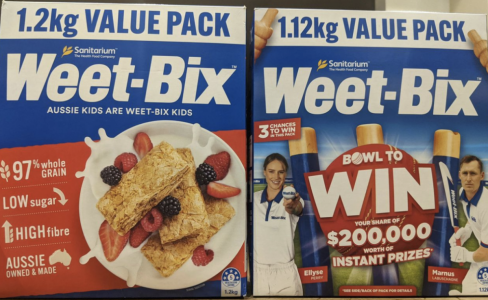Products are 'shrinking' and Aussies are not happy about it
- Replies 13
The cost of living has been rising steadily for years now (you've probably heard this enough times already). It seems like every time we go to buy something, the price has gone up since the last time we made a purchase.
And while this is frustrating enough in and of itself, it turns out that there's another way supermarkets are slowly eroding our wallets - and it's even more sneaky than just increasing prices!
It's called 'shrinkflation', and it refers to the practice of food companies and supermarkets reducing the size or quantity of products without reducing the price. So you're paying the same amount of money, but you're getting less in return.
What's even more concerning is that this trend appears to be on the rise in Australia… It's disheartening, especially when you feel like your budget is already stretched thin as it is!

For example, on the popular forum website Reddit, one user shared that they noticed Weet-Bix boxes have gradually been shrinking in size over recent years, from 1.2kg to 1.12kg - but they still cost $5! That means you're paying around $4.46 per kilo instead of $4 per kilo like you used to be able to.
Another person pointed out that Nutri-Grain value packs have shrunk from 805g to 765g - but they have increased in price from $8.50 to $10! That works out at a whopping $13 per kilo now.
And if you want Black Swan dips, be prepared for a smaller serving size too; 200g tubs are being phased out in favour of 170g tubs… for the same price! Outrageous!

Of course, it's not just supermarket staples that are being hit by shrinkflation; even our beloved cafes are being impacted. There have also been complaints from several Aussies that the portion sizes at their favourite cafes have shrunk, while the costs have remained the same (or even increased).
On social media, a customer aired out their frustration when one café in Sydney's northern suburbs halved the amount of avocado toast you get on your plate, but they're still charging the same price.

It's not just Aussies who are being affected by this either; shrinkflation is a global issue. In the UK, for example, a study found that the average pack of toilet paper had shrunk by almost 3% in just 5 years - but the price had stayed the same.
So, what can we do about it? Unfortunately, not a whole lot. This is a sneaky way for supermarkets to slowly increase prices without us really noticing.
All we can do is try to be more aware of what we're buying, and compare prices and serving sizes before we make a purchase.
Don't worry, though; the SDC team promises to give you up-to-date details as well as money-saving advice so you can set your budget in advance.
So, members, what are your thoughts on 'shrinkflation', and do you think you've been a victim as well? Let us know in the comments below!
And while this is frustrating enough in and of itself, it turns out that there's another way supermarkets are slowly eroding our wallets - and it's even more sneaky than just increasing prices!
It's called 'shrinkflation', and it refers to the practice of food companies and supermarkets reducing the size or quantity of products without reducing the price. So you're paying the same amount of money, but you're getting less in return.
What's even more concerning is that this trend appears to be on the rise in Australia… It's disheartening, especially when you feel like your budget is already stretched thin as it is!

Aussies are feeling the pinch of 'shrinkflation' in supermarkets and restaurants. Credit: Getty Images.
For example, on the popular forum website Reddit, one user shared that they noticed Weet-Bix boxes have gradually been shrinking in size over recent years, from 1.2kg to 1.12kg - but they still cost $5! That means you're paying around $4.46 per kilo instead of $4 per kilo like you used to be able to.
Another person pointed out that Nutri-Grain value packs have shrunk from 805g to 765g - but they have increased in price from $8.50 to $10! That works out at a whopping $13 per kilo now.
And if you want Black Swan dips, be prepared for a smaller serving size too; 200g tubs are being phased out in favour of 170g tubs… for the same price! Outrageous!

Serving sizes have downsized on certain grocery store staples like Weet-Bix, but the prices have stayed the same. Credit: Reddit.
Of course, it's not just supermarket staples that are being hit by shrinkflation; even our beloved cafes are being impacted. There have also been complaints from several Aussies that the portion sizes at their favourite cafes have shrunk, while the costs have remained the same (or even increased).
On social media, a customer aired out their frustration when one café in Sydney's northern suburbs halved the amount of avocado toast you get on your plate, but they're still charging the same price.
Key Takeaways
- Aussies are accusing companies and supermarkets of 'shrinkflation', which is the practice of charging the same price for a smaller quantity or serving.
- This change has been incremental, so some shoppers may not even notice at all.
- Supermarket staples and restaurant portions are some of the items affected by this trend.
It's not just Aussies who are being affected by this either; shrinkflation is a global issue. In the UK, for example, a study found that the average pack of toilet paper had shrunk by almost 3% in just 5 years - but the price had stayed the same.
So, what can we do about it? Unfortunately, not a whole lot. This is a sneaky way for supermarkets to slowly increase prices without us really noticing.
All we can do is try to be more aware of what we're buying, and compare prices and serving sizes before we make a purchase.
Don't worry, though; the SDC team promises to give you up-to-date details as well as money-saving advice so you can set your budget in advance.
So, members, what are your thoughts on 'shrinkflation', and do you think you've been a victim as well? Let us know in the comments below!







